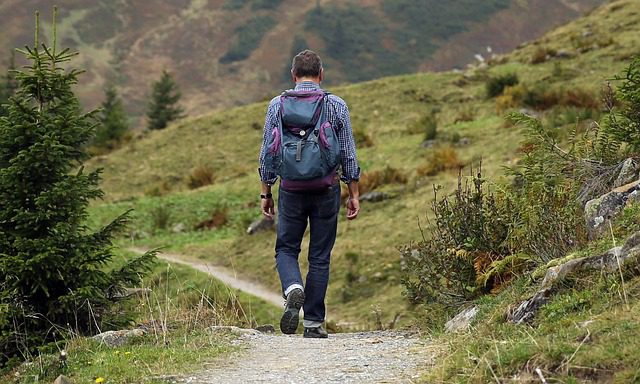Hiking is a great way to get outside and explore nature while also getting a good workout. If you’re new to hiking, it’s important to familiarize yourself with some basic techniques and tips before hitting the trails.
In this article, we’ll go over everything you need to know about Hiking Techniques for Beginners and safe hikes as a beginner.
The Basics of Hiking for Beginners

Before starting your hike, it’s important to understand the fundamentals of hiking. This includes what to wear, how to plan your route, and how to stay safe while on the trail.
What to Wear (Hiking Basics)
The key to being comfortable and safe while hiking is wearing the right clothing. It’s important to dress in layers, as temperatures can change quickly while on the trail. A moisture-wicking base layer, a warm middle layer, and a waterproof outer layer are essential. Avoid cotton clothing as it retains moisture and can cause discomfort or even hypothermia.
Don’t forget to wear appropriate footwear as well. Invest in a sturdy pair of hiking boots with good traction to prevent slipping and protect your feet from rough terrain.
Planning Your Route
As a beginner, it’s best to start with shorter and easier trails. Research the trail beforehand and make sure it matches your skill level. Consider factors such as elevation gain and distance when choosing a route. It’s also important to let someone know where you’re going and when you plan on returning.
Staying Safe on the Trail
Hiking can be a fun and rewarding activity, but it’s important to stay safe while on the trail. Here are some tips to help you have a safe hike:
Wearing Proper Footwear (Beginner Hiking Skills)
We mentioned this briefly before, but it’s worth repeating – wearing appropriate footwear is crucial for staying safe while hiking. Make sure your boots fit well and are broken in before hitting the trail. Good traction is also important, especially on more challenging terrain.
Following Hiking Etiquette
Hiking etiquette ensures that everyone can enjoy their time on the trail. Here are a few key rules to follow:
- Yield to uphill hikers
- Stay on marked trails and do not trespass onto private property
- Leave no trace – take your trash with you and avoid damaging plants or wildlife
- Be respectful of other hikers and their space
Preparing for Emergencies and Weather Changes
While we hope that nothing goes wrong on your hike, it’s always best to be prepared. Pack a first aid kit in case of any minor injuries, as well as extra layers and rain gear in case the weather changes unexpectedly. It’s also a good idea to bring a map and compass or GPS device in case you get lost.
Tips for Enjoying a Great Hike
Hiking isn’t just about reaching the summit – it’s also about enjoying the journey. Here are some tips to help you have an enjoyable hike:
Exploring Nature’s Beauty
Take the time to appreciate the natural beauty around you. Look for interesting plants and animals, take photos, and enjoy the scenery. Remember to stay on marked trails and respect any wildlife you encounter.
Taking Breaks and Hydrating Properly
It’s important to take breaks while hiking, especially on longer or more challenging hikes. Use these breaks not only to rest your muscles but also to hydrate and refuel your body. Make sure to bring enough water and snacks for the duration of your hike.
Essential Equipment for Hikers
Having the right equipment can make or break a hiking trip. Here are some essential items you should have with you:
A Backpack with Necessary Supplies
A good backpack is necessary to carry all of your gear comfortably. Make sure to choose one with a sturdy frame and plenty of compartments for organization. Pack your first aid kit, extra layers, snacks, water, and any other necessary supplies in your backpack.
GPS or Maps to Track Location (Essential Hiking Gear)
In addition to having a good sense of direction and map reading skills, it’s always helpful to have a GPS device or maps on hand while hiking. These tools can help you stay on track and avoid getting lost.
Keeping Yourself Motivated on the Trail
Hiking can be physically and mentally challenging, especially for beginners. Here are some tips to help you stay motivated during your hike:
Setting Small Goals During Your Hike (Trail Walking Tips)
Instead of focusing solely on reaching the summit or completing a long trail, set smaller goals along the way. These can be as simple as reaching a certain landmark or taking a break at a specific point. By setting achievable goals, you’ll feel a sense of accomplishment and motivation to continue.
Ending Your Trip Right
As your hike comes to an end, it’s important to take care of yourself and properly refuel and hydrate.
Refueling and Rehydrating Post-Hike
After a long hike, your body will need to replenish the energy and fluids that were used. Make sure to have a nutritious meal and drink plenty of water once you’ve completed your trip.
Additional Resources for New Hikers
For those who are new to hiking, it’s always helpful to seek advice and guidance from experienced hikers or local organizations. They can provide valuable tips, training, and resources to help you become a confident and responsible hiker.
Conclusion: Hiking Techniques for Beginners
Don’t hesitate to reach out for assistance as you embark on your hiking journey! So, if you’re ready to hit the trails and explore nature’s beauty, remember these key techniques for beginners and have fun on your adventure!
Happy hiking! 🌲🥾🌞
FAQs
What are the 3 basic skills in hiking?
The three fundamental skills in hiking are navigation, survival, and outdoor ethics.
Navigation: Learn to read maps, use a compass, and understand trail markers for safe and efficient navigation.
Survival: Basic survival skills include understanding how to find or purify water, build a shelter, and make a fire if needed.
Outdoor Ethics: Respect for the environment and adherence to Leave No Trace principles are crucial, ensuring minimal impact on natural spaces.How do beginners train for hiking?
Beginners can train for hiking by focusing on cardiovascular fitness, strength, and endurance.
Cardiovascular Fitness: Engage in activities like walking, running, or cycling to improve endurance and stamina.
Strength Training: Develop leg muscles, especially quadriceps and calves, through exercises like lunges and squats. Strengthen the core and upper body for balance and stability.
Endurance Training: Gradually increase the duration and difficulty of walks or hikes to build endurance over time.How can I make hiking easier?
Making hiking easier involves proper preparation and adopting smart strategies.
Choose Beginner-Friendly Trails: Opt for well-marked, less challenging trails when starting.
Pack Light: Carry only essential gear to reduce the weight of your backpack.
Take Breaks: Schedule short breaks to rest and hydrate during the hike.
Appropriate Footwear: Wear comfortable, supportive hiking shoes or boots.
Proper Pacing: Start with a comfortable pace and gradually increase speed as fitness improves.
Use Hiking Poles: Hiking poles provide stability, reduce impact on joints, and make uphill sections more manageable.






